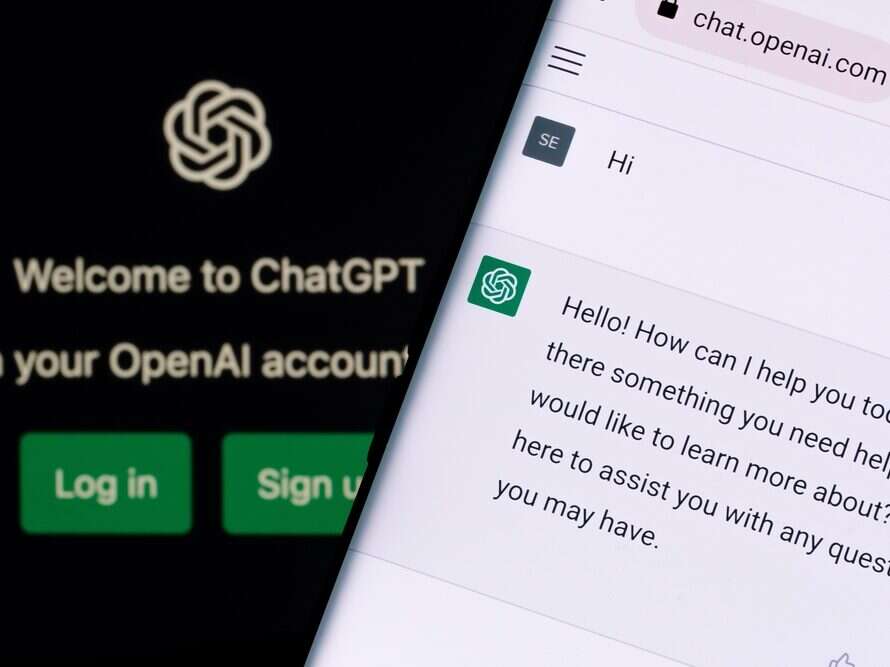
The UK Government’s proposal to allow AI companies to automatically train their models on online content unless the rightsholder specifically opts out has been described as “unworkable”.
A range of responses to the Government consultation on its proposed change to the existing copyright regime have been published, with many slamming the potential effect on the media industry.
The Government is currently analysing responses to the consultation, which closed in February. It is assessing four proposed options for UK copyright in the AI era: making no change to existing law, beefing up creator copyright protections, giving AI companies broad copyright exemptions or the opt-out model.
The last option is the one currently preferred by the Government – but opposed by publishers, the creative industries and even some of the leading AI companies.
OpenAI and Google have each made different recommendations, with OpenAI calling for far more expansive exemptions for data mining while Google sought an amended version of the proposed opt-out regime.
Press Gazette has analysed the responses to the consultation that have been made available so far.
OpenAI: Liability for copyright infringement should fall on end user, not model developers
ChatGPT developer OpenAI said it supported the second of the Government’s proposed options, “a broad data mining exception” which would “allow data mining on copyright works… without right holders’ permission”.
The company suggested this could come with “a broad [text and data mining] exception based on three requirements”: that developers use “lawfully obtained copies”, that those copies are not “further distributed or used for other purposes” and that developers “should take reasonable measures to prevent infringing outputs”.
It argued that this would prevent the use of pirated material in training, and could be paired with a law prohibiting the use of AI to create unauthorised replicas of works or impersonation. In cases where someone uses AI to infringe copyright, for example the creation of a verbatim reproduction, OpenAI said “liability should fall on the infringing user—not the developer who acts in good faith to prevent such outputs”.
The company also said it supported the widespread automated adoption of machine-readable rights reservations embedded in works.
OpenAI was not satisfied with the Government’s proposal for an opt-out system. It said that would be “similar in practice” to doing nothing, “except with added regulatory costs on AI developers”.
Such restrictions, it said, would prevent the UK’s development in areas where copyright holders would not compete with AI, for example translation and medical research, and would mean the country would not attract capital investment for AI projects.
In response to a question about whether AI developers should disclose the sources of their training material the company said “a system that requires greater transparency for AI developers would ultimately intensify rightsholders’ demands for mass data licensing”.
It said transparency requirements should instead be “high level”: “AI developers invest heavily in refining their data and training processes, and publicising this knowledge would alter competitive dynamics between AI developers and could have national security implications”.
Google backs amendment allowing more data mining with rights reservations
Google argued for the creation of a commercial research exception in addition to an existing non-commercial research exception in UK copyright law, as well as text and data mining “for any purpose, with rights reservations for rights holders”.
The tech giant was not as supportive as OpenAI of the Government’s “option two” proposal to create a broad copyright exemption for data miners, saying rights holders “should have choice and control”.
Instead it made a “strong recommendation” toward the Government’s preferred option of an opt-out system – with the caveat “that excessive transparency requirements… could hinder AI development and impact the UK’s competitiveness in this space”.
Doing nothing, Google said, “does not offer sufficient clarity” for innovation, while strengthening copyright by requiring licensing in all cases “would make the UK significantly less competitive compared to other jurisdictions and may not increase the level of licensing”.
Like OpenAI, however, Google argued that when an AI tool is used to create an infringing work “any resulting liability” should be for the person who used the tool, not the AI developer. “Had that standard applied in the past, we would not have legal access to photocopiers, personal audio and video recording devices or personal computers.”
Google also used its consultation response to hit back at the general idea publishers have a right to remuneration over the use of their content in training AI.
“We support web publishers in exercising their rights under UK law to prohibit or authorise use of their content for training AI models through a myriad of tools available,” it said. “However, these rights are exclusive and do not translate to remuneration rights.”
Training a model on web data, the company argued, is “non-expressive” and therefore does not infringe on copyright.
“We reject the framing of rights reservation as a licensing mechanism. Web publishers have rights to authorise or prohibit use (which they already can do under existing law), and Google-Extended [the web scraper that feeds Google’s AI] and other similar mechanisms allow them to exercise that right by opting out. However, this does not extend to a right to be paid…
“No individual type or piece of content – be it news, blogs, recipes or reviews – has unique value in the training of an AI model. Given the volume of data that models need to train on, any particular work in and of itself is not necessary for that training.”
BBC: Government AI copyright proposal ‘unworkable’ and ineffective
In a summary of its consultation response, the BBC said it was “positive about the potential of AI” for its work and the broader UK economy, noting it had already used generative AI to add subtitles to BBC Sounds programmes and translate BBC News content into other languages.
However the Government’s proposals, director of nations and executive sponsor of gen AI Rhodri Talfan Davies wrote, are “currently unworkable and would not achieve the Government’s aims”.
“We do not believe securing these goals requires changes that weaken how content is protected under the UK’s Intellectual Property regime – a regime recognised internationally as a ‘gold standard’ and a critical foundation of the UK’s £124.6bn creative industries.”
Instead, the corporation proposed a model “underpinned by fair licensing arrangements and the authorised use of content”, which it said “would bring together the experience, skills and resources of both the creative and AI sectors to create new value for our users, the creative sector and the UK”.
NUJ: ‘Vehemently oppose’ development of tech for IP theft
The National Union of Journalists did not endorse any of the four proposals, instead saying it might have considered the option to strengthen copyright for creators had it been strengthened with transparency measures.
Instead, it called for an opt-in mechanism, “either for individuals or as part of collective licensing”.
The union said it “recognise[d] opportunities presented by AI but vehemently oppose the development of technologies that involve breaches to the intellectual property rights of our members…
“We do not agree that there is ambiguity around the current copyright regime,” it added, saying an opt-out or broader exemption to copyright rules would result “in financial gain for AI developers at the expense of journalists”.
The union argued that regulation should require AI-generated output to be labelled as such and that there should be greater transparency requirements around the identification of the sources of data used for training, pre-training and fine-tuning of models.
“There must be clear and enforceable sanctions for those breaching copyright law, and processes for rights holders must be accessible and user-friendly. Without adequate deterrents for companies, many of whom have considerable financial resources, it is journalists, creators and freelances who bear the burden of infringements and the emotional and economic toll.”
PPA: ‘Mandatory transparency’ on AI needed, backed by a statutory regulator
The PPA, which represents magazine and specialist publishers, said it “strongly oppose[d] any weakening of copyright laws that would allow AI developers to use publishers’ content without permission or compensation” in a summary of its consultation response.
In common with the NUJ, the industry body said there should be “mandatory transparency” around both AI web crawling and the deployment of AI tools, including disclosure of data sources.
AI firms, the PPA said, should have to “obtain explicit permission from publishers and pay for content through fair licensing agreements, whether individual or collective”, and a statutory regulator should be able to enforce compliance and halt non-compliant practices.
The organisation also asked that publishers not be compelled “into unfair deals by linking search result visibility to AI training participation”.
News Media Association chief executive Owen Meredith has said that the opt-out proposal “fails to address the real issue. The UK’s gold standard copyright law is already clear; what is missing is robust enforcement and transparency requirements that empower creative businesses to assert their rights”.
He added: “Instead of proposing unworkable systems such as the ‘rights reservations’ (or opt-out’) regime, the government should focus on implementing transparency requirements within the existing copyright framework.”
ICO: New copyright regime would need clarity around mining of personal data
The Information Commissioner’s Office, which is responsible for enforcing data protection, cautioned over unintended consequences arising from the Government’s proposed copyright changes, saying it would be important to provide clarity “that this will not in and of itself constitute a determination of the lawful basis for any personal data processing…
“A substantial amount of the material involved in [text and data mining] may be personal data and the lawfulness of processing would need to be evaluated on a case-by-case basis.”
Furthermore, organisations that do choose to opt-in to data mining may incur data protection obligations: the ICO gave the example that “a wedding photographer may be a controller for the photos of people they have photographed so they will need to ensure that sharing that data… is fair, transparent and lawful”.
Parliamentary committees warn it is not clear how opt-out regime could be technically deployed
Science, Innovation and Technology Committee chair Chi Onwurah wrote that the Government had not set out how an opt-out copyright regime would work at a technical level and that an evidence session had “heard how technically challenging it would be to deliver aspects of the Government’s preferred outcome.
“However, we’re confident that technology can deliver a solution, and it must do so – the status quo is unsustainable.
“A technical solution needs to be easy to use and accessible for everyone, whether you’re an AI start-up or an individual rights holder. The Government cannot meet its commitments to the creative and AI sectors without this.”
Culture, Media and Sport Select Committee chair Caroline Dinenage meanwhile was more critical, saying the Government should not introduce an opt-out regime “given that the technical measures to enforce these opt-outs do not yet exist.
“The government’s proposal for the onus to be on creators to opt-out of AI training is like burglars being allowed into your house unless there’s a big sign on your front door expressly telling them that thievery isn’t allowed.”
In a joint letter to the Government the chairs also stressed that existing UK copyright law already protects not just creative industries but also the AI companies themselves, something they said was illustrated by the case of Chinese AI developer DeepSeek, “which OpenAI alleges breached ChatGPT’s terms of service by copying outputs to train its model”.
Regardless of the decision on copyright law the chairs called for “measures to provide transparency on AI training data”, including over what data has been used to train a model.
They dismissed an AI company argument that identifying training data would compromise trade secrets, arguing that under UK law only the model itself would constitute a trade secret.
Whatever copyright regime is chosen, they added, mechanisms around compliance, enforcement and redress “must be based on the principles of fairness, practicality and, most importantly, accessibility to all”.
Email pged@pressgazette.co.uk to point out mistakes, provide story tips or send in a letter for publication on our “Letters Page” blog







